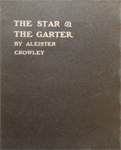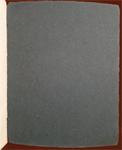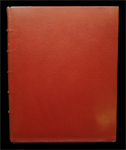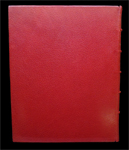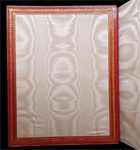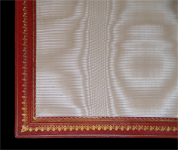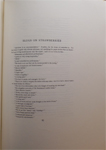100th
MP

|
THE
100th
MONKEY
PRESS |
|
|
|
Limited Editions by Aleister Crowley & Victor B. Neuburg |
|
Bibliographies |
|
Download Texts
»
Aleister
Crowley
WANTED !!NEW!!
|
|
THE STAR AND THE GARTER |
|
Image Thumbnails |
||||||||||||||||||||||||||||||
|
Title: |
The Star and the Garter. |
|
||||||||||||||||||||||||||||
|
Variations: |
|
|||||||||||||||||||||||||||||
|
Publisher: |
Watts & Co.,17 Johnson's Court, London.1 |
|||||||||||||||||||||||||||||
|
Printer: |
Turnbull and Spears, Edinburgh.1 |
|||||||||||||||||||||||||||||
|
Published At: |
London.1 |
|||||||||||||||||||||||||||||
|
Date: |
1903.1 |
|||||||||||||||||||||||||||||
|
Edition: |
1st Edition. |
|||||||||||||||||||||||||||||
|
Pages: |
92.2 |
|||||||||||||||||||||||||||||
|
Price: |
|
|||||||||||||||||||||||||||||
|
Remarks: |
The Star and the Garter commemorated Crowley's entire circle of women at the time: fiancée Eileen Gray was the star, while the garter was three other ladies, most likely Kelly’s fiancée, Sybil Meugens; model Nina Olivier; and sculptress Kathleen Bruce.5 |
|||||||||||||||||||||||||||||
|
Pagination:2 |
|
|||||||||||||||||||||||||||||
|
Contents: |
- The Star And The Garter - Appendix |
|||||||||||||||||||||||||||||
|
Author’s Working Versions: |
|
|||||||||||||||||||||||||||||
|
Other Known Editions: |
|
|||||||||||||||||||||||||||||
|
Bibliographic Sources: |
|
|||||||||||||||||||||||||||||
|
Comments by Aleister Crowley: |
I gradually sickened of the atmosphere of Paris. It was all too easy. I flitted restlessly to London and back, and found no rest for the sole of my foot. I had even got engaged to be married, but returning after a week in London I was partly too shy to resume relations with my fiance, and partly awake to the fact that we had drifted under the lee shore of matrimony out of sheer lack of moral energy. This lady claims notice principally as the model for several poems, notably (in Rosa Mundi, and other Love Songs) “The Kiss”, “Eileen” and the poems numbered 14, 15, 16, 18, 21 to 28. She was also the “Star” in The Star and the Garter, Which I wrote at this time; and the three women connected with the “Garter” were an English lady with a passion for either, an acrobat and model whom I called my boot-button girl because her face was “round and hard and small and pretty”, and thirdly Nina Olivier. Nina is described in the poem itself and also in several lyrics, notably “The Rondel”—“You laughing little light of wickedness”. My adoration of Nina made her the most famous girl in the quarter for a dozen years and more. She figures, by the way, in my “Ordeal of Ida Pendragon”.
The Star and the Garter
contains some of my best lyrics and is also important as marking
a new step in my poetic path. I had mastered form better than I
had ever done before; I had welded lyrics into a continuous opus
with an integral purpose, without artificiality, such as to some
extent mars Orpheus and even Alice. I spent two
days writing the poem; but I do not consider it a waste of time. — The Confessions of Aleister Crowley. New York, NY. Hill and Wang, 1969. Page 335-336. ______________________________
Another affectation of the women art students was to claim to be treated exactly as if they were men in every respect. Gerald, always eager to oblige, addressed one of his models as old fellow, to her great satisfaction. Then he excused himself for a momentary absence in the terms which he would have used to another man. On his return, the lady had recovered her “sex and character”, and had bolted. Woman can only mix with men on equal terms when adopts his morality lock, stock and barrel, and ceases to set an extravagant artificial value on her animal functions. The most high-principled woman (alleged) insists on the supreme value of an asset which is notoriously of no value whatever in itself. The Star and the Garter deals frankly with this problem, among others. — The Confessions of Aleister Crowley. New York, NY. Hill and Wang, 1969. Page 356. ______________________________
My activities as a publisher were at this time remarkable. I had issued The God-Eater and The Star & the Garter through Charles Watts & Co. of the Rationalist Press Association, but there was still no such demand for my books as to indicate that I had touched the great heart of the British public. I decided that it would save trouble to publish them myself. — The Confessions of Aleister Crowley. New York, NY. Hill and Wang, 1969. Page 406. ______________________________
It is
ridiculous to make anything important depend on the appetites of
an American matron. The same may be said of The Star and the
Garter. |
|||||||||||||||||||||||||||||
|
Reviews: |
Mr. Aleister Crowley’s volumes succeed one another with a rapidity that almost takes one’s breath away. The Star and the Garter, hitherto only accessible in a privately printed edition, is now offered to the public at the low price of one shilling. The Society for the Propagation of Religious Truth has assuredly no connection with the S.P.C.K. or kindred bodies; but, whatever its aims may be, it may be congratulated on the format of its publications. But more than wide margins and bold type are needed to make The Star and the Garter understanded of the people, which, like much of the author’s verse, is symbolical and introspective. In form it bears outward semblance to Tennyson’s Maud, but in spirit it is akin to the Poems and Ballads of Mr. Swinburne. Baudelaire and W.E. Henley are discernable literary influences in this feverish riot of soul at odds with flesh in an atmosphere charged with erotic emotion. The physiological explanation of love, in Canto XII, beginning with
“To and fro The motor axis of the brain Hits on the cerebellum hard, Makes the medulla itch;”
and so on to thirteen lines, may be technically correct, but it certainly fails to constitute quintessential poetry. Occasionally Mr. Crowley startles us by prosaic metaphor, as
“Then let not memory shrink abashed, Once started on this giddy whirl! Hath not a lightning image flashed Of my divine boot-button girl?”
Farther on he vouchsafes a quaint explanation of this epithet:
“Her face is round and hard and small And pretty—hence the name I gave her Of the boot-button girl.”
We like him best in lyrical passages such as:
“And who is then the moon? Bend close, And clothe me in a silken kiss, And I will whisper to my rose The secret name of Artemis.”
It would, doubtless, be unjust to tax Robert Browning with having been intentionally cryptic in his utterances, but no one assuredly would venture to gainsay the poet’s vindication of his poetry, that he did “not write for the smoking-room.” To the end of time —The Westminster Review, November 1904. ______________________________
These verses appear to relate the love-making of a young lady with “inviolate violet eyes” and a man of strong passions. The poetry is of the incoherently sensuous type, and we hear a good deal about the moon and of unrestrained love and kisses. Some songs are interspersed. A couple of stanzas will illustrate the character of Mr. Crowley’s writing:—
“Make me a rose-leaf with your mouth And I will waft it through the air To some far garden of the South, The herald of our happening there!”
“To sea! Before us leap the waves, The wild white combers follow. Invoke, ye melancholy slaves The morning of Apollo!”
Enclosed with the volume is a leaflet which states that the “Society for the Propagation of Religious Truth” offers a prize of £500 for an essay upon the works of Aleister Crowley. This method of propagating minor poetry is not more remarkable than the publication of such poetry by the society. —The Manchester Courier, 18 November 1904. ______________________________
“The Star and the Garter,” by Aleister Crowley. - The poems of Aleister Crowley are “caviare to the general,” popular editions notwithstanding. “The Star and the Garter” is a peculiar dissertation on love, which, so far as we understand it, appears to be a justification of fleeting passions leading up to the “star” of a pure attachment, which, however, is in no wise injured by the lesser loves, symbolized by a “garter.” “Ye Sword of Song” (called by Christians “The Book of the Beast”) is full of erudition and satire. In it all religions are discussed and discredited, and a great agnostic conclusion is stated and proved. The second part of the book is written in prose, and “deals with possible means of research so that we may progress from the unsatisfactory state of a sceptic to a real knowledge founded on scientific method and basis of the spiritual facts of the Universe.” “The Star and the Garter” has been called “the greatest love poem of modem times,” and a scheme is on foot to furnish every free library, every workman’s club, every hotel, every reading-room in every English speaking country in the world with a copy of “Ye Sword of Song.” All particulars can be obtained from the Secretary S.P.R. T., Boleskine, Foyers, Inverness. —The Bath Chronicle, 24 November 1904. ______________________________
This is a most excellent book—as a book. It is so beautifully printed on such good paper that we were confident of finding the poetry excellent. Some of it is and some of it is not. All of it is (we suppose) clever; so clever, indeed, that one finds some of it utterly unintelligible. Now, much of (say) Browning is unintelligible at a first reading, but somehow it is charming, and you are tempted to wrestle with it. But you would never think of going back on Aleister Crowley's nonsense. You feel that if it has a meaning, it will prove a very poor one if you could find it; and that is a pity. At the same time there is much that is charming in these love songs, and they might be hailed as excellent if only someone could go over them with a ruthless blue pencil. If any reader wishes to know how to secure a prize of £100 he or she should approach the Society names above: address—Boleskine, Foyers, Inverness. —The Arbroath Herald, 20 October 1904. ______________________________
Even when understanding lags behind we read with pleasure. —The Liverpool Courier, date unknown. ______________________________
“The Star and the Garter.” By Aleister Crowley. (Society for the Propagation of Religious Truth, Inverness. Price 1s.)—This is certainly a wonderful book for the money, paper and type are both very fine, and the margins are excellent. The book is accompanied by a circular announcing “The chance of the year! The chance of the century!! The chance of the geologic period!!!” Such a chance is not to be lightly passed, and our readers may like to know that it is the offer of a hundred pound prize for the best essay on the Works of Aleister Crowley, the date for which will be kept open til August, 1905. Intending competitors can obtain the works in question at cost price, and they are reminded that “beginners with brains may have a better chance than professional critics, who are perhaps palsied with prejudice, but, while granting that the language of “The Star and Garter” is often fine, the imagery pleasing, and the rhythm and rhyme faultless, the theme is so long drawn, and the interest so remote, we relinquish our chance (perhaps also remote) of the prize without regret, and trust some beginner with brains will secure it. —The Northern Whig, 29 October 1904. ______________________________
The Star and the Garter. By Alister [sic] Crowley. Popular Edition.—Mr. Crowley should be a happy man. His “Star and Garter,” which an accompanying leaflet describes as “the greatest love poem of modern times,” was sold out before publication, necessitating a reprint that, as “popular” editions go, is an unusually handsome production. Moreover a prize is offered for an essay on the author’s collected works, and the opportunity is announced as “the chance of the Geologic Period!” —The Bookseller, 5 January 1905. ______________________________
It is a little difficult perhaps for a plain man to see how the publication in a popular edition of this poem, or set of poems, can make for 'the propagation of religious truth.' But the poetry is all so vague and indefinite that a subtle intellect might possibly be able to extract a few grains of religious truth. As far, however, as we can make out—and we have read Mr. Crowley's verses with painstaking effort—they appear to be love poems, in the course of which his mistress's garter figures largely, she being the star; hence the peculiar title, with its reminiscences of ancient hostelries. For a shilling popular edition the book is marvellously well sent forth, and is a first-rate modern instance of Sheridan's beautiful quarto page with a neat rivulet of text meandering through a meadow of margin. Along with the book we received the prospectus of a £100 prize for an essay on Mr. Crowley's works, which we have not heard of before, but which appear to be pretty numerous. The competition is open to all the world, and may be either hostile or appreciative. —The Perthshire Advertiser, 24 October 1904. |
|||||||||||||||||||||||||||||
